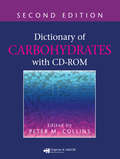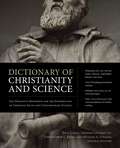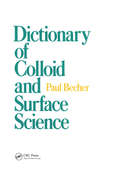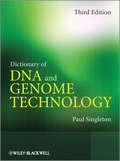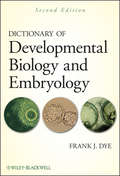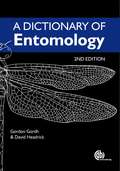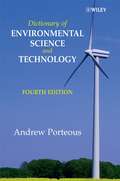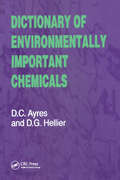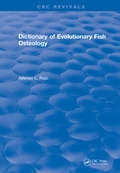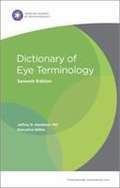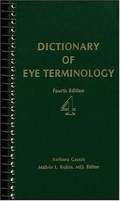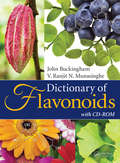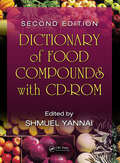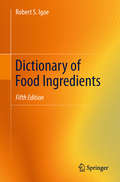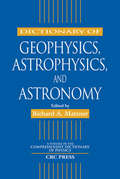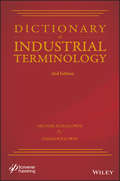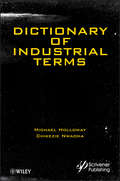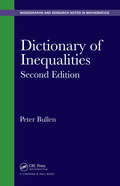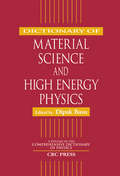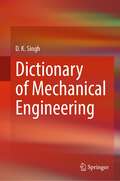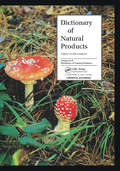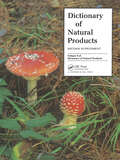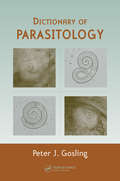- Table View
- List View
Dictionary of Carbohydrates
by Peter M. CollinsAn easy-to-use reference source for all scientists working with carbohydrates, the Dictionary of Carbohydrates with CD-ROM, Second Edition builds on the success of its previous edition by providing a substantially increased number of compounds. The presentation is sharpened by a careful review of existing entries. With 24,000 compounds, it represen
Dictionary of Christianity and Science: The Definitive Reference for the Intersection of Christian Faith and Contemporary Science
by Tremper Longman III Christopher L. Reese Michael Strauss Paul CopanThe Dictionary of Christianity and Science provides, in one volume, entries on over 450 key terms, theories, individuals, movements, and debates at the intersection of Christian faith and contemporary science. In addition, because certain topics such as the age of the Earth and the historicity of Adam and Eve provoke disagreement among Christians, the dictionary includes “Counterpoints”-like essays that advocate for the views most commonly held among evangelicals. Representatives of leading perspectives present their arguments vigorously but respectfully in these advocacy essays, allowing readers to compare options and draw their own conclusions. The dictionary is also fully cross-referenced and entries include references and recommendation for further reading. Edited by Paul Copan, Tremper Longman III, Christopher L. Reese, and Michael G. Strauss, the Dictionary of Christianity and Science features a top-notch lineup of over 140 contributors in the fields of biblical studies, theology, philosophy, history, and various sciences. A unique reference work, it will be useful for scholars, pastors, students, and any Christian wanting to better understand the most relevant issues and ideas at the intersection of Christian faith and science.
Dictionary of Colloid and Surface Science
by Paul BecherThis book is a mini-encyclopedia providing a wealth of information on all aspects of colloid and surface science, including historical background information, insights into the implications of definitions, biographical notes, and sketches of scientists who have contributed to the field.
Dictionary of DNA and Genome Technology
by Paul SingletonDNA technology is evolving rapidly, with new methods and a fast-growing vocabulary. This unique dictionary offers current, detailed and accessible information on DNA technology to lecturers, researchers and students throughout the biomedical and related sciences.The third edition is a major update, with over 3000 references from mainstream journals and data from the very latest research - going well beyond the remit of most science dictionaries. It provides clear explanations of terms, techniques, and tests, including commercial systems, with detailed coverage of many important procedures and methods, and includes essay-style entries on many major topics to assist newcomers to the field. It covers topics relevant to medicine (diagnosis, genetic disorders, gene therapy); veterinary science; biotechnology; biochemistry; pharmaceutical science/drug development; molecular biology; microbiology; epidemiology; genomics; environmental science; plant science/agriculture; taxonomy; and forensic science.
Dictionary of Developmental Biology and Embryology
by Frank J. DyeA newly revised edition of the standard reference for the field today—updated with new terms, major discoveries, significant scientists, and illustrations Developmental biology is the study of the mechanisms of development, differentiation, and growth in animals and plants at the molecular, cellular, and genetic levels. The discipline has gained prominence in part due to new interdisciplinary approaches and advances in technology, which have led to the rapid emergence of new concepts and words. The Dictionary of Developmental Biology and Embryology, Second Edition is the first comprehensive reference focused on the field's terms, research, history, and people. This authoritative A-to-Z resource covers classical morphological and cytological terms along with those from modern genetics and molecular biology. Extensively cross-referenced, the Dictionary includes definitions of terms, explanations of concepts, and biographies of historical figures. Comparative aspects are described in order to provide a sense of the evolution of structures, and topics range from fundamental terminology, germ layers, and induction to RNAi, evo-devo, stem cell differentiation, and more. Readers will find such features of embryology and developmental biology as: Vertebrates Invertebrates Plants Developmental genetics Evolutionary developmental biology Molecular developmental biology Medical embryology The author's premium on accessibility allows readers at all levels to enhance their vocabulary in their field and understand terminology beyond their specific focus. Researchers and students in developmental biology, cell biology, developmental genetics, and embryology will find the dictionary to be a vital resource.
Dictionary of Entomology
by Gordon Gordh David HeadrickThis fully updated new edition of the Reference Reviews Top Ten Print Reference Source 2004 is a comprehensive, fully cross-referenced collection of terms, names and phrases used in entomology, incorporating an estimated 43,000 definitions. It is the only listing which covers insect anatomy, behaviour, biology, ecology, histology, molecular biology, morphology, pest management, taxonomy and systematics. The origin, etymology, part of speech and definition of each term and phrase are all provided, including the language, meaning or root of each term and constituent parts. The common names of insects, their scientific binomen and taxonomic classification are provided, with diagnoses of pest species in many cases. All insect order, suborder, superfamily, family and subfamily names are given, together with the diagnostic features of orders and families. With new and updated terms, particularly in molecular biology, phylogeny and spatial technology, this is an essential reference for researchers and students of entomology and related disciplines.
Dictionary of Environmental Science and Technology
by Andrew PorteousThis superb and highly-acclaimed dictionary includes over 4000 in-depth entries on scientific and technical terminology associated with environmental protection and resource management. In addition, it contains numerous illustrations, a wide range of international case studies and extensive cross-references to guide the reader. The new edition will be a major update with 30% new material, additional illustrations and a greatly expanded list of relevant web resources.
Dictionary of Environmentally Important Chemicals
by David C. Ayres Desmond G. HellierA quick reference for information on chemicals of environmental importance, this dictionary has been carefully compiled and designed to make it useful for students. About 600 substances are covered in alphabetically arranged entries: these include some 70 pesticides. Entries vary in detail depending on individual aspects, but in general they include: composition/structure; physical propertied; sources; environmentally relevant reactions and pathways; detection; and toxic effects and regulatory limits. Many entries include short case histories. Immediately relevant sources are quoted for individual entries and a bibliography of principle publications and texts for further reading is included.
Dictionary of Evolutionary Fish Osteology (CRC Press Revivals)
by lfonso L. RojoThe purposes of the present dictionary are to define the osteological and taxonomic terms referring to fishes, and to explain the rationale, both anatomical and function, of fish skeletal units, in an evolutionary and biological context. This branch of biology – fish osteology – provides a deeper insight into fish evolution, bone homologies, fish terminology, and fish taxonomy.
Dictionary of Eye Terminology, 4th Edition
by Barbara Cassin Melvin L RubinThis comprehensive reference has been written for the purpose of making ophthalmological terminology comprehensible to the person without a scientific background.
Dictionary of Flavonoids
by John Buckingham V. Ranjit MunasingheWidely distributed throughout plant families, flavonoids give many flowers and fruits their vibrant colors. They also play a role in protecting the plants from microbe and insect attacks. More importantly, the consumption of foods containing flavonoids has been linked to numerous health benefits. Recent research indicates that flavonoids can be nutritionally helpful by triggering enzymes that reduce the risk of certain cancers, heart disease, and age-related degenerative diseases. Foods that contain high amounts of flavonoids include blueberries, red beans, cranberries, and blackberries. Many other foods, including red and yellow fruits and vegetables and some nuts, as well as red wine and certain teas are also rich in flavonoids.Due the potential health benefits, research into flavonoids and their potential beneficial effects on human health continues unabated. Dictionary of Flavonoids with downloadable resources lists all known flavonoids (approximately 13,000) in a single volume. It details chemical structures, physical properties, and biological source, and also includes a concise bibliography. Derived from the well-respected Dictionary of Natural Products, it is presented in a compact dictionary format, and is an invaluable reference source for all those working in this area. The book is accompanied by downloadable resources that are fully searchable by chemical structure as well as by physical properties and chemical names.Organized in alphabetical order, each page is packed with authoritative information that readers can easily access. The book and downloadable resource combination gives researchers powerful tools for unlocking and utilizing the secrets held within the colors of the plant kingdom.
Dictionary of Food Compounds
by Shmuel YannaiThe increasing world population, competition for arable land and rich fishing grounds, and environmental concerns mandate that we exploit in a sustainable way the earth’s available plant and animal resources for human consumption. To that end, food chemists, technologists, and nutritionists engage in a vast number of tasks related to food availability, quality, safety, nutritional value, and sensory properties—as well as those involved in processing, storage, and distribution. To assist in these functions, it is essential they have easy access to a collection of information on the myriad compounds found in foods. This is particularly true because even compounds present in minute concentrations may exert significant desirable or negative effects on foods.Includes a foreword by Zdzislaw E. Sikorski, Gdansk University of Technology, Poland; Editor of the CRC Press Chemical & Functional Properties of Food Components Series. Dictionary of Food Compounds, Second Edition is presented in a user-friendly format in both hard copy and fully searchable downloadable resources. It contains entries describing natural components of food raw materials and products as well as compounds added to foods or formed in the course of storage or processing. Each entry contains the name of the component, the chemical and physical characteristics, a description of functional properties related to food use, and nutritional and toxicological data. Ample references facilitate inquiry into more detailed information about any particular compound. Food Compounds Covered:Natural Food ConstituentsLipidsProteinsCarbohydratesFatty acidsFlavonoidsAlkaloidsFood ContaminantsMycotoxinsFood AdditivesColorantsPreservativesAntioxidantsFlavorsNutraceuticalsProbioticsDietary SupplementsVitaminsThis new edition boasts an additional 12,000 entries for a total of 41,000 compounds, including 900 enzymes found in food. No other reference work on food compounds is as complete or as comprehensive.
Dictionary of Food Ingredients
by Robert S. IgoeThe Dictionary of Food Ingredients is a unique, easy-to-use source of information on over 1,000 food ingredients and additives. Like the previous editions, the Fifth Edition provides clear and concise information on currently used additives, including natural ingredients, FDA-approved artificial ingredients, and compounds used in food processing. The dictionary entries, organized in alphabetical order, include information on ingredient functions, chemical properties, and uses in food products. This revised and updated fifth edition also features a new section, "Food Definitions and Formulations," a thoroughly expanded list of food ingredients approved for use in the European Union, with E numbers, as well as new information on existing and more recently approved ingredients.
Dictionary of Forensic Psychology
by David P. Farrington Graham J. Towl David A. Crighton Gareth HughesOver the past decade, forensic psychology has grown rapidly as a subject, with an increasing number of forensic psychologists working in demanding roles in prisons, secure training facilities, and high, medium and low security healthcare facilities as well as other parts of the criminal justice system. This Dictionary is designed to meet the needs of both students and practitioners. It contains approximately 100 entries on key terms and concepts, arranged alphabetically and contributed by leading academic and practicing forensic psychologists.
Dictionary of Geophysics, Astrophysics, and Astronomy
by Richard A. MatznerThe Dictionary of Geophysics, Astrophysics, and Astronomy provides a lexicon of terminology covering fields such as astronomy, astrophysics, cosmology, relativity, geophysics, meteorology, Newtonian physics, and oceanography. Authors and editors often assume - incorrectly - that readers are familiar with all the terms in professional literature. With over 4,000 definitions and 50 contributing authors, this unique comprehensive dictionary helps scientists to use terminology correctly and to understand papers, articles, and books in which physics-related terms appear.
Dictionary of Industrial Terminology
by Michael D. Holloway Emma HollowayThis is the most comprehensive dictionary of maintenance and reliability terms ever compiled, covering the process, manufacturing, and other related industries, every major area of engineering used in industry, and more. The over 15,000 entries are all alphabetically arranged and include special features to encourage usage and understanding. They are supplemented by hundreds of figures and tables that clearly demonstrate the principles & concepts behind important process control, instrumentation, reliability, machinery, asset management, lubrication, corrosion, and much much more.With contributions by leading researchers in the field:Zaki Yamani Bin Zakaria Department, Chemical Engineering, Faculty Universiti Teknologi Malaysia, Malaysia Prof. Jelenka B. Savkovic-Stevanovic, Chemical Engineering Dept, University of Belgrade, Serbia Jim Drago, PE, Garlock an EnPro Industries family of companies, USA Robert Perez, President of Pumpcalcs, USA Luiz Alberto Verri, Independent Consultatnt, Verri Veritatis Consultoria, Brasil Matt Tones, Garlock an EnPro Industries family of companies, USA Dr. Reza Javaherdashti, formerly with Qatar University, Doha-Qatar Prof. Semra Bilgic, Faculty of Sciences, Department of Physical Chemistry, Ankara University, Turkey Dr. Mazura Jusoh , Chemical Engineering Department, Universiti Teknologi Malaysia Jayesh Ramesh Tekchandaney, Unique Mixers and Furnaces Pvt. Ltd. Dr. Henry Tan, Senior Lecturer in Safety & Reliability Engineering, and Subsea Engineering, School of Engineering, University of Aberdeen Fiddoson Fiddo, School of Engineering, University of Aberdeen Prof. Roy Johnsen, NTNU, Norway Prof. N. Sitaram , Thermal Turbomachines Laboratory, Department of Mechanical Engineering, IIT Madras, Chennai India Ghazaleh Mohammadali, IranOilGas Network Members' Services Greg Livelli, ABB Instrumentation, Warminster, Pennsylvania, USA Gas Processors Suppliers Association (GPSA)
Dictionary of Industrial Terms
by Chikezie Nwaoha Michael D. HollowayThis is the most comprehensive dictionary of maintenance and reliability terms ever compiled, covering the process, manufacturing, and other related industries, every major area of engineering used in industry, and more. The over 15,000 entries are all alphabetically arranged and include special features to encourage usage and understanding. They are supplemented by hundreds of figures and tables that clearly demonstrate the principles & concepts behind important process control, instrumentation, reliability, machinery, asset management, lubrication, corrosion, and much much more.With contributions by leading researchers in the field:Zaki Yamani Bin Zakaria Department, Chemical Engineering, Faculty Universiti Teknologi Malaysia, Malaysia Prof. Jelenka B. Savkovic-Stevanovic, Chemical Engineering Dept, University of Belgrade, Serbia Jim Drago, PE, Garlock an EnPro Industries family of companies, USA Robert Perez, President of Pumpcalcs, USA Luiz Alberto Verri, Independent Consultatnt, Verri Veritatis Consultoria, Brasil Matt Tones, Garlock an EnPro Industries family of companies, USA Dr. Reza Javaherdashti, formerly with Qatar University, Doha-Qatar Prof. Semra Bilgic, Faculty of Sciences, Department of Physical Chemistry, Ankara University, Turkey Dr. Mazura Jusoh , Chemical Engineering Department, Universiti Teknologi Malaysia Jayesh Ramesh Tekchandaney, Unique Mixers and Furnaces Pvt. Ltd. Dr. Henry Tan, Senior Lecturer in Safety & Reliability Engineering, and Subsea Engineering, School of Engineering, University of Aberdeen Fiddoson Fiddo, School of Engineering, University of Aberdeen Prof. Roy Johnsen, NTNU, Norway Prof. N. Sitaram , Thermal Turbomachines Laboratory, Department of Mechanical Engineering, IIT Madras, Chennai India Ghazaleh Mohammadali, IranOilGas Network Members' Services Greg Livelli, ABB Instrumentation, Warminster, Pennsylvania, USA Gas Processors Suppliers Association (GPSA)
Dictionary of Inequalities (Chapman & Hall/CRC Monographs and Research Notes in Mathematics)
by Peter BullenAdding new results that have appeared in the last 15 years, Dictionary of Inequalities, Second Edition provides an easy way for researchers to locate an inequality by name or subject. This edition offers an up-to-date, alphabetical listing of each inequality with a short statement of the result, some comments, references to related inequalities, an
Dictionary of Material Science and High Energy Physics
by Dipak BasuMore than 3,000 terms with clear, working definitions, alternative meanings, and related references comprise this uniquely focused lexicon. Published in a convenient, paperback format, it covers chemical, energy, nuclear, plasma, condensed matter, and solid-state physics, fluid dynamics, quantum mechanics, quantum optics, thermodynamics, and materials science.
Dictionary of Mechanical Engineering
by D. K. SinghThis book contains important words and terminologies of the core subjects in mechanical engineering such as engineering mechanics, strength of materials, fluid mechanics, thermodynamics, IC engines, heat and mass transfer, refrigeration and air-conditioning, manufacturing processes, theory of machines, industrial engineering and management, electric vehicles, etc. that are explained in a concise and lucid manner. The contents also touch upon some terminologies of basic science subjects. This dictionary is an easy-to-use and a practical resource which will be highly useful for undergraduate and postgraduate students, researchers, and industry professionals in the field of mechanical engineering.
Dictionary of Natural Products, Supplement 1
by John BuckinghamThis Dictionary draws and checks the structure diagrams to ensure their accuracy and consistency, and presents the data within entries of natural products in a logical manner which reconciles as far as possible inconsistencies and inaccuracies in the literature.
Dictionary of Natural Products, Supplement 2
by John BuckinghamContaining fully authenticated data on virtually all known natural products, the "Dictionary of Natural Products", main work, published in 1993 was the end result of over 12 years compilation and editing by a large team of contributors. The resulting Dictionary contains 100,000 natural products and their derivatives organized into approximately 35,000 entries. Volume 9 of the Dictionary contains the result of a thorough review of the natural product literature for the year 1992-3, the results of which are presented as a mixture of new entries and updated entries containing modified information. The following categories of natural products are covered: amino acids, peptides and protiens; carbohydrates; nucleosides and nucleotides; lipids; antibiotics; alkaloids; steroids and terpenoids; flavonoids; lignans; lichen acids; coumarins; polyacetylenes; polypyrroles; semiochemicals and other miscellaneous aliphatic compounds; and all other classes of miscellaneous metabolites. A particular feature of the Dictionary is the care which has been taken to draw and check the structure diagrams to ensure their accuracy and consistency, and to present the data within entries in a logical manner which reconciles as far as possible inconsistencies and inaccuracies in the literature, as determined by the subject editors. Careful attention has also been taken with nomenclature to ensure user-friendly access to all of the data. All of the contents are fully indexed by name, molecular formula, Chemical Abstracts Service (CAS) Registry Number and species from which isolated. An additional unique feature is the type of compound classification scheme which has been evolved for this Dictionary to list all natural products under one or more headings, bringing closely related compounds together under one index heading. Extensive references, labelled to show their content, are listed for each entry, allowing rapid location of data of a particular type, e.g. spectroscopic information. The "Dictionary of Natural Products" is a reference source on natural products, with Volume 9 (the second supplementary volume) a useful addition to keep the Dictionary up-to-date.
Dictionary of Oil, Gas, and Petrochemical Processing
by Alireza Bahadori Chikezie Nwaoha Malcolm William ClarkIn industry, miscommunication can cause frustration, create downtime, and even trigger equipment failure. By providing a common ground for more effective discourse, the Dictionary of Oil, Gas, and Petrochemical Processing can help eliminate costly miscommunication.An essential resource for oil, gas, and petrochemical industry professionals, enginee
Dictionary of Parasitology
by Peter J. GoslingAlthough many books have been published on various aspects of human, animal, and plant parasitology, as well as the public health problems associated with parasites, none to date has offered a comprehensive glossary for those confronted with the discipline's exceptionally extensive terminology. To meet this need requires a dedicated text that can h
